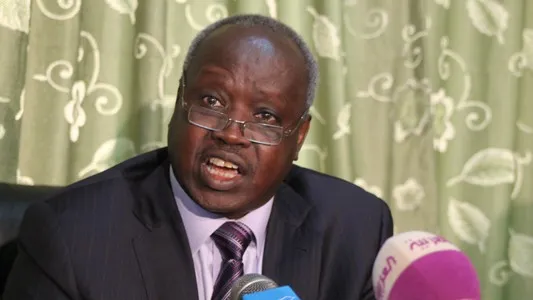
South Sudanese politics were thrown into fresh turmoil this week after Nhial Deng Nhial, one of the country’s most seasoned politicians and a long-time member of the SPLM Political Bureau, declared he was freezing his party membership and forming a new reformist movement.
In an 18-page statement titled “The Salvation Path”, Nhial accused President Salva Kiir’s government of presiding over corruption, insecurity, and democratic paralysis, warning that the SPLM — once the symbol of liberation — had become a “comatose shell” of its founding vision.
“The SPLM has lost its moral compass,” Nhial wrote. “Our people are poorer, divided, and fearful. The dream of freedom has turned into the reality of despair.”
The 73-year-old politician announced the creation of the South Sudan Salvation Movement (SSSM) under the umbrella of the United People’s Alliance (UPA), led by exiled opposition figure Pagan Amum. He said the SSSM would push for “a total renaissance of the SPLM” rather than replace it entirely.
Political observers say Nhial’s defection exposes mounting frustration within the SPLM elite over the government’s handling of the transition and its repeated postponement of elections promised under the 2018 Revitalized Peace Agreement.
The move also comes as peace talks under Kenya’s Tumaini Initiative remain suspended, deepening fears that South Sudan’s fragile roadmap to democracy could unravel before elections planned for 2026.
Nhial warned that the regime in Juba “cannot hold free and fair elections” because it fears losing power, urging citizens to demand a new constitution and a peaceful democratic transition.
From Loyal Insider to Dissident Voice
Nhial Deng Nhial is no stranger to South Sudan’s political frontlines. The son of independence-era politician William Deng Nhial, he joined the SPLM in 1983 and quickly rose through its ranks, becoming one of the movement’s key legal and diplomatic architects.
He helped negotiate the 2005 Comprehensive Peace Agreement (CPA), which paved the way for independence, and later represented the government in several peace processes, including the 2014–2018 revitalized talks that ended years of civil war.
Over the past two decades, Nhial has held a string of senior posts — including Minister of Defence, Foreign Affairs, and Presidential Affairs — under Kiir’s administration. His sudden break from the SPLM marks a dramatic reversal for a figure once seen as a stabilizing force within the ruling party.
Analysts say his new movement could attract disillusioned SPLM members and reform-minded youth who see the government as increasingly authoritarian and disconnected from the population’s hardships.
“Nhial’s defection adds symbolic weight to growing calls for reform,” said a Juba-based political analyst. “If he mobilizes effectively, it could trigger a realignment ahead of the 2026 elections.”
As the country grapples with economic collapse, insecurity, and stalled peace implementation, Nhial’s challenge may be less about toppling the government outright and more about reviving the spirit of accountability that once defined the SPLM’s struggle.




